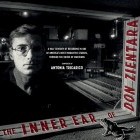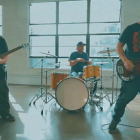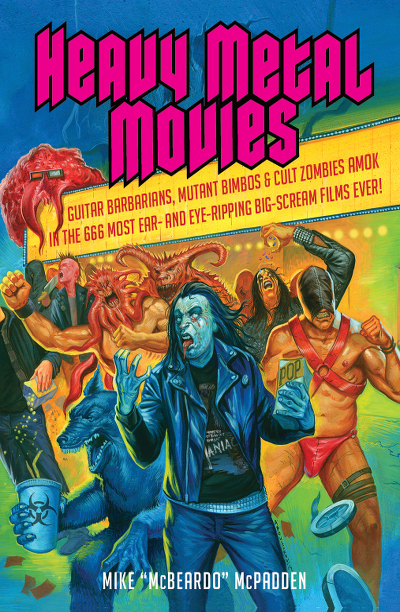
When Magnus Henriksson of the Brooklyn-based publishing house Bazillion Points told me they were going to release a book about cult movies and their connection to heavy metal, all I could think to myself was, "Finally!" It seemed like a no-brainer type of concept for a book, but surprisingly, no one had tried it before. When Henriksson told me the full title for the book was going to be Heavy Metal Movies: Guitar Barbarians, Mutant Bimbos & Cult Zombies Amok in the 666 Most Ear- and Eye-Ripping Big-Scream Films Ever!, I knew it was going to be another winner for the publishers who also brought us such tomes as Swedish Death Metal and Hellbent for Cooking.
Written by Mike "McBeardo" McPadden, Heavy Metal Movies recently arrived in stores, and it lives up to the hype I built for it inside my head. Even if you aren't a film geek like McPadden clearly is, you'll still get a kick out of his descriptions and witty observations for each of the movies he includes in the book. Whether it's obscure Italian exploitation flicks, or slasher B-movies from the '80s, McPadden has you covered. I found myself sticking Post-it notes to pages that included movies I wanted to see based on McPadden's descriptions. I'm at about 30 pages right now and I haven't even gone through the entire book yet.
As soon as Heavy Metal Movies arrived in my mailbox, I asked Henriksson if he could hook me up with a McPadden interview. It pays to have connections.
Did you fall in love first with movies or music as a kid?
It's probably music, but what I remember most viscerally was loving movies more than any other kid I ever met. It started with Pinocchio, then Planet of the Apes, and then everything else. In particular, I was drawn to horror. My mother swears I came out of the womb running toward anything that looked like a monster movie.
You talk about your love for The Rocky Horror Picture Show as a young kid. I've tried a couple of times, but I just can't get into that movie. What was it about that film that resonated so deeply with you at that young age?
Well, bear in mind that I'm 45 years old. Rocky Horror hit big when I was 7, I got the record when I was 8, and I finally saw the movie right after I turned 10—complete with the girl who played Janet in the live cast flashing her boobs!
Rocky Horror was a major, major cultural phenomenon at the time, really captivating teenagers I thought were dangerous and cool in Brooklyn and New Jersey, along with artsy types who I also thought were dangerous and cool over the bridge in Manhattan, and it was about sex and horror, all performed with songs that I loved. Do note, too, that I was insanely horny by age 5 and I took up a scholarly interest in sex from the time that I could read.
Thus, I'll never view Rocky Horror through any prism other than that one. Is it a good movie on its own? I think it starts great, loses its way fairly quickly, and collapses into a mess long before the end. But it's resonated with desperate, wayward, and creative youths generation after generation for 40 years with no end in sight, leading them to further explorations, expressions, and experiences. So sometimes "good" takes on a broader definition.
Like you, I grew up in one of New York City's outer boroughs (Queens), but I was too young to get to truly experience the grindhouses that dotted Times Square in the '70s and early to mid-'80s. Did each theater play a different set of exploitation films or did some of them also feature Hollywood hits?
In my experience, which started in 1982 when I was 13 and saw The Beast Within and Humongous at the Lyric Theatre on 42nd Street, the Deuce always mixed Hollywood movies in with pure exploitation fare. Initially what alerted me to the area was combing through the classified listings in the newspaper of what movies were playing and seeing completely incongruous bills of, like, The China Syndrome, Young Lady Chatterley, and The Big Bird Cage or Moonraker, Phantasm, and Black Emanuelle. Typically, the non-B-movies were action-oriented Hollywood stuff or big-budget horror, but they regularly opened in one of the grindhouses. I remember the Police Academy films always dotting the block, backed by second features of Monster Shark and Tenebrae and such.
It must have been something special walking down one of those streets at night.
In terms of the experience: Times Square, with 42nd Street snaking through its heart like a neon sewer pipe, was well-lit, frantic, filthy, and palpably dangerous, even with dozens of cops seeming to be walking the beat at all hours. The real pull was porn, prostitution, and live sex shows, with drugs a close second, and trash movies just sort of being there for when you were in between indulging in the other stuff. You got hustled and propositioned with every step; lots of people got mugged. I only ever got mugged on the subway, never above ground. Overall the area was too bright, too loud, too crowded, too smelly, and explosively alive.
Inside, the theaters were almost all rotting old movie palaces serving as sleep stations for the homeless, temporary insane asylums, and safe havens for hooker trade and drug exchanges. Audience members reacted to whatever was on screen as though they were physically living in it. You could drink booze and get high openly. In fact, it would have been lunacy not to do that. Fights broke out. Snoring, farts, and smoke—tobacco, marijuana, and crack—clouded your every breath. Almost always, though, the movies ran without any serious incidents among the crowd. They came, they yelled and stamped their feet, they got loaded, and then left.
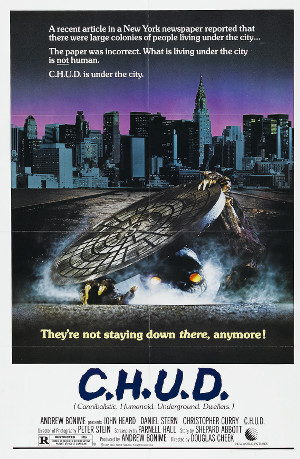
I remember seeing Class of 1984 as a really young kid at a theater called the Jackson Triplex and the crowd in there was rowdy. It added to the experience. Do you believe seeing a great, trashy horror/action film in a theater is better than seeing it in the privacy of your home?
I used to think that. Now I don't. The difference back then is that the audience could not help but react out loud to the movie. Now when that happens, there are quotes around it. It's ironic and self-aware—and worthless.
I'll always love seeing exploitation movies on a big screen, but I get furious now when dipshits in the crowd start to "play along." I become relentless in convincing them to stop. My wife has been sufficiently embarrassed [laughs].
I saw many of the films you cover in the book during the VHS era of the mid to late '80s. Do you consider that to be the golden era of horror/exploitation?
For me, the last golden era of horror and exploitation runs from 1968, with Night of the Living Dead, to 1985 with The Return of the Living Dead. A couple of gems squeaked through in 1986, primarily The Texas Chainsaw Massacre 2, but, for me, once home video started shuttering grindhouse theaters and movies went straight to tape, everything changed and not for the better. Pardoxically, once you could actually hold a physical movie, it felt like they became disposable. That stated, a lot of great heavy metal movies did come out in the second half of the 1980s, just as the music took over pop radio.
Another thing I thought about while reading Heavy Metal Movies was that like heavy metal records, I chose which VHS I would rent at the video store by how cool the cover for it was. That's the same, unscientific method I used when I would go record shopping when I was a kid.
I did that all the time at the video store, less often with records. I felt like a movie was just a rental and you could definitely watch at least part of it once, but a record was a commitment. Still, my video store mantra was: "The bigger the box, the cooler the movie." All those titles from Wizard Video, Key Video, Gorgon—they all came in toaster-sized packaging with the most colorfully lurid imagery you could hope to see. It was just another great ballyhoo trope of the exploitation mavens—the way they would dress up marquees and theater entrances on 42nd Street with stills and cut-outs. More often than not, those big box VHS movies delivered a memorable good time, too.
I have always been a big fan of the Enzo G. Castellari-directed films you cover in Heavy Metal Movies like 1990: The Bronx Warriors. Anything that was supposed to take place in NYC and also involved gratuitous violence has always been up my alley. Since you're older than me (I'm 39), were you turned off knowing that his, and many of the other films in this subgenre, were actually filmed in Europe and not on location? I didn't know then, and I'm not sure if it would have mattered to me anyway.
On the contrary, I thought those films not being made in New York made them better. The sheer ludicrousness of the idea that anybody might think those movies were filmed in NYC was ballsy and charming. I, too, was drawn to any depiction of New York in exploitation. Of that era, Death Wish 3 is the only one where the action actually does appear to be shot along some hellscape in the South Bronx, but they actually filmed it in England!
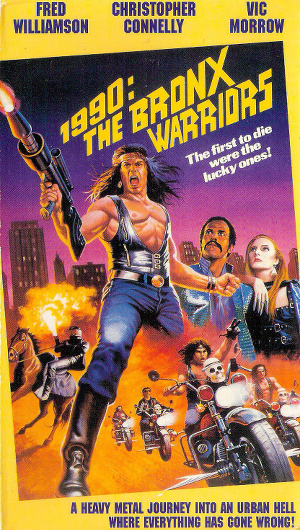
Speaking of Castellari, he was infamous in the movie industry for churning out copycat movies at an alarming pace. How did these guys get away with that? As far as you know, did any of the bigger studios ever threaten legal action?
All those movies were basically mash-ups of Escape from New York, The Warriors, and the Mad Max films. I'm not aware of the studios even being aware they existed, let alone acknowledging them. The only real B-movie I ever read about running into that kind of legal trouble was Abby, a 1974 Blaxploitation rip-off of The Exorcist. Warner Brothers did file some kind of injunction and prints of Abby slipped into oblivion. Apparently, Warners was threatening action against any movie containing an exorcism for a while, but, man, that must have gotten exhausting.
Back in the '80s, pre-Internet, do you remember it being tougher to find information out about the more obscure films you cover in your book or the underground metal bands you wanted to learn about?
Pre-Internet, you had to do hard labor, and you got one person's version of information, one nugget at a time. Even so, there was joy in those discoveries that is lost in age when anything and everything is instantly available.
One of my fondest childhood memories is poring over every page of every Leonard Maltin Movie Guide, and circling any title he rated "BOMB." I'd then comb through TV Guide each week looking for those titles, and staying up as late as necessary to watch them. How many movies did I see that way, total? 50, maybe. But I remember the experience of watching each and every one of them. YouTube can show me all the ones I missed, but it can't recreate that feeling.
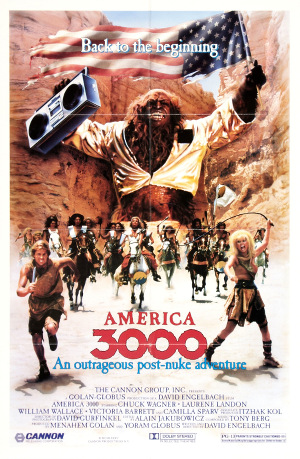
A lot of people say that the most dedicated heavy metal fans in the world come from the Scandinavian countries. I'm not sure if that's true or not, but is there a specific region of the world that you think appreciates exploitation films much more than other place?
From the 1950s to the end of the '80s, I'd have to say Italy. Since then, I think it's Market One: the U.S.—particularly now in the age of places like the Alamo Drafthouse opening all over and the Cinefamily out in Los Angeles. You definitely hear and read about metal festivals all over the world; the same is not nearly as true when it comes to exploitation movie devotees and gatherings.
What's your take on what I call "nu-exploitation" films like Hobo With a Shotgun and Machete?
The worst. I hate it. Those are nothing but multimillion dollar Troma movies—winking, knowing, ironic, above-it-all, "ain't we so bad we're ADORABLE" worthlessness, made for audiences that need to be forcefed processed feces and dictated to exactly how, when, and where they're having a good, sleazy time.
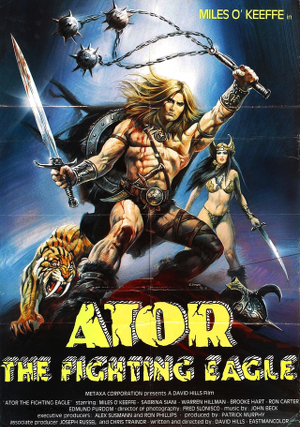
I really appreciate the fact that you break up the films in Heavy Metal Movies by subgenres like "nunsploitation" and "post-apocalyptic." If you had to pick your three favorite exploitation film subgenres, which ones would they be and why?
I can't just say horror, I know, and I can't realistically single out one horror subgenre over another. Dreck and gold seem to be equally distributed throughout them all—heaviest on the dreck, of course.
I'll go post-apocalypse and sword and sorcery, because of the color and imagination that went into even the shabbiest of those films, and then sexploitation on the order of naked cheerleaders and women in prison, because I am who I am.
Is there a Holy Grail movie for you? I'm talking about a film that that you would pay top dollar for if you had the chance to scoop it up.
Heaven Can Help, which may have been made in 1984 but is dated 1989. It stars Jinx Dawson, the Nordic ice sorceress of Coven, the very first Satanic rock band to put a record out, as a witch. People sent me clips and still photos, and I was able to assemble those enough to write a review, but the finished product has so far proven entirely elusive. Still, where there's a will to power, there are at least 666 different ways...
Heavy Metal Movies is available on Amazon from the twisted minds at Bazillion Points.








